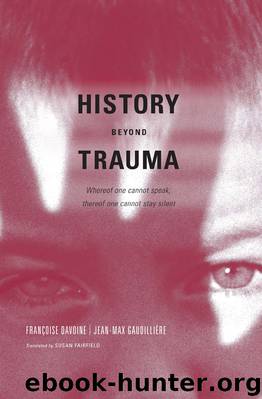History Beyond Trauma by Francoise Davoine

Author:Francoise Davoine [Davoine, Francoise]
Language: eng
Format: epub
ISBN: 978-1-59051-658-4
Publisher: Other Press
Published: 2013-03-26T04:00:00+00:00
On the basis of his experience fighting on the Austro-Russian front in World War I, Wittgenstein firmly maintained this position. During World War II, he initially asked to work as a dispensary porter in a London hospital during the Blitz. There he handed out medication but advised the patients not to take it (Monk 1990).
He was later summoned to take part in studies of wounded airmen in the military hospital in Newcastle, where he recommended that not even the word shock be used. He felt that this word, equivalent to a stigma, could only sink patients further into their depressive slump, creating an entirely disastrous psychic inwardness, stricken by the absence of any other. In the official report he worked on, he even suggests that the word shock be written upside down as a sign of its uselessness and harmfulness. He was very firmly of the opinion that the patient be allowed to describe his experience in his own way. Wittgenstein was still reading Freud at this time and wondering about the difference between dreams of fear and wishful dreams (Monk 1990).
Even the notion of stress, universally disseminated today by the diagnosis of PTSD, is inadequate, as Claude Barrois (in Briole et al. 1994) emphasizes:
What we are trying to name here is not a mechanical, purely physiological, post-accident reaction but the existence of a response to a tragic misfortune, to the meaninglessness that has befallen the world, to an existential threat that reifies the subject. It is as though each psychic victim embodied the gap in the social fabric. If there is no other to whom to speak, the trauma reduces the individual to an interiority invaded by annihilation anxiety and terror. An object among objects, he is doomed to aloneness, to an absolute abandonment, to a break with all communal and cultural bonds. Nothing in contemporary culture is available to help reintegrate the victim into the world of the living. Psychoanalysis has the merit of being the only discipline that can really do something: find the trace of the breaking point and of a prior time in which fantasy and dreams had their place. For death, one’s own, that one has looked in the face, has no representation. [p. 73]
Download
This site does not store any files on its server. We only index and link to content provided by other sites. Please contact the content providers to delete copyright contents if any and email us, we'll remove relevant links or contents immediately.
4 3 2 1: A Novel by Paul Auster(12362)
The handmaid's tale by Margaret Atwood(7749)
Giovanni's Room by James Baldwin(7315)
Asking the Right Questions: A Guide to Critical Thinking by M. Neil Browne & Stuart M. Keeley(5751)
Big Magic: Creative Living Beyond Fear by Elizabeth Gilbert(5744)
Ego Is the Enemy by Ryan Holiday(5407)
The Body: A Guide for Occupants by Bill Bryson(5072)
On Writing A Memoir of the Craft by Stephen King(4924)
Ken Follett - World without end by Ken Follett(4717)
Adulting by Kelly Williams Brown(4561)
Bluets by Maggie Nelson(4542)
Eat That Frog! by Brian Tracy(4511)
Guilty Pleasures by Laurell K Hamilton(4437)
The Poetry of Pablo Neruda by Pablo Neruda(4088)
Alive: The Story of the Andes Survivors by Piers Paul Read(4017)
White Noise - A Novel by Don DeLillo(3999)
Fingerprints of the Gods by Graham Hancock(3983)
The Book of Joy by Dalai Lama(3966)
The Bookshop by Penelope Fitzgerald(3841)
